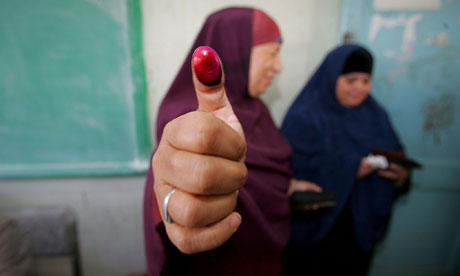ICTs are often used by civil society organisations to monitor elections. But what works best? Photograph: Mike Nelson/EPA
Type the words 'ICT4D', the popular acronym that describes information communication technologies for development, into any search engine and you may be forgiven for thinking you've stumbled upon the cure for all development ills. Projects are being run by the entire spectrum of development organisations, using every form of communication device (from radio through to mobile phones and satellite systems), to tackle the major challenges of our age: access to water, information, education, markets and many others.
ICTs are also being widely used to empower civil society and promote social justice. The near ubiquity of mobile phones means that every citizen has the power (if not always the means) to send or receive information directly via text message. The implications of this were summed up neatly in a report published by Tufts University: "Transparency breeds self-correcting behaviour among all types of actors, since neither governments nor businesses or individuals want to be caught doing something embarrassing or illegal."
But the transformation from citizen to 'witness' or even informant – through crowdsourcing or crowdmapping exercises – comes with challenges. These include the lack of adequate infrastructure in-country and the issue of understanding the local context. There is also the problem of "drowning in too much information with too little effective use," as ICT4D researcher, Tony Roberts puts it.
Increasingly important – yet often overlooked by NGOs – are the security risks associated with using ICTs to campaign, particularly in fragile or authoritarian states. The NGO Tactical Technology Collective explains: "While computers and the internet can be extremely powerful tools for advocacy, they also present new risks for a group that is already, in many cases, quite vulnerable. As more advocates have begun to rely on digital technology to achieve their outreach, data-collection, information design, communication and mobilisation objectives, these risks have become more severe."
So as the use of information communication technologies by development organisations continues to grow, how do we define what works and why? What are the best ways to manage some of the challenges outlined above and how can activists take advantage of the opportunities while minimising the risks?

Δεν υπάρχουν σχόλια:
Δημοσίευση σχολίου